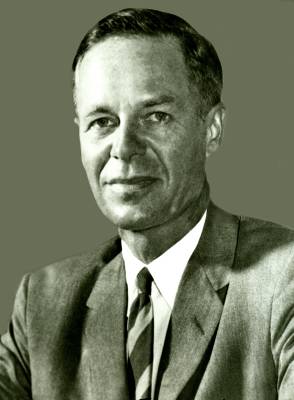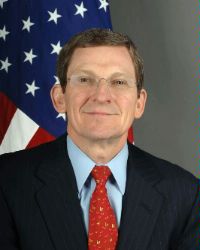The Latin American Section was established as a partial successor to Special War Policies Unit (SWPU) on August 28, 1943. The Latin Section acted as the technical legal staff of the United States representative on the Emergency Advisory Committee for Political Defense, also known as the Inter-American Advisory Committee for Political Defense. The committee was created as an advisory body by Resolution XVII of the Third Meeting of the Ministers of Foreign Affairs of the American Republics, held at Rio de Janeiro in January 1942. The Resolution provided that the Governing Board of the Pan American Union (PAU) consult the Governments of the American Republics, determine the functions of the committee, prepare the regulations for governing its activities, and fix its budget of expenditures.
The report of the Special Committee of the Governing Board of the PAU was approved by the Board at its session on February 25, 1942, and was sent to the 21 Governments with the proposed regulations. The Governing Board gave approval of these two documents on April 6, 1942, and named the Governments of Argentina, Brazil, Chile, United States, Mexico, Uruguay, and Venezuela to be members of the Committee who would represent the 21 nations. Carl B. Spaeth and William Sanders were successively members from the United States.
In each country a liaison officer was named to serve the members of the Committee headquartered in Montevideo. Lawrence A. Knapp, Special Assistant to the Attorney General, was Liaison Office for the United States. Miguel A. de Capriles, Special Assistant to the Attorney General, was assigned to the staff of the Liaison Officer for the United States. He also served as Assistant Chief of the Latin American Section. The Committee for Political Defense attempted to establish a solid front of the Americas against common external dangers. The Committee recommended ways that the Governments of the Americas, acting individually and as a group, could prevent invasions by Axis powers or their nationals, agents, or sympathizers.
The section was terminated with War Division, December 28, 1945.

The Organization of American States is an international organization founded on 30 April 1948 to promote cooperation among its member states within the Americas.

Charles Woodruff Yost was a career U.S. Ambassador who was assigned as his country's representative to the United Nations from 1969 to 1971.

Marc Isaiah Grossman is an American former diplomat and government official. He served as United States Ambassador to Turkey, Assistant Secretary of State for European Affairs, and Under Secretary of State for Political Affairs. He was most recently the United States Special Representative for Afghanistan and Pakistan and is currently a Vice Chairman of The Cohen Group, a business strategic advisory firm headed by former U.S. Secretary of Defense William Cohen, and a Vice Chair of the German Marshall Fund board of trustees.

The Inter-American Treaty of Reciprocal Assistance is an agreement signed in 1947 in Rio de Janeiro among many countries of the Americas. The central principle contained in its articles is that an attack against one is to be considered an attack against them all; this was known as the "hemispheric defense" doctrine. Despite this, several members have breached the treaty on multiple occasions. The treaty was initially created in 1947 and came into force in 1948, in accordance with Article 22 of the treaty. The Bahamas was the most recent country to sign and ratify it in 1982.

Joseph Anthony Califano Jr. is an American attorney, professor, and public servant. He is known for the roles he played in shaping welfare policies in the cabinets of Presidents Lyndon B. Johnson and Jimmy Carter and for serving as United States Secretary of Health, Education, and Welfare in the Carter administration. He is also the founder and chairman of The National Center on Addiction and Substance Abuse at Columbia University (CASAColumbia), an evidence-based research organization, which is now the Partnership to End Addiction, where Califano holds the title of Chair Emeritus.

Lawrence H. Fountain was a Democratic U.S. representative from North Carolina from 1953 to 1983.

Pan-Americanism is a movement that seeks to create, encourage, and organize relationships, an association, and cooperation among the states of the Americas, through diplomatic, political, economic, and social means.

Sha Zukang is a Chinese diplomat who was head of the United Nations Department of Economic and Social Affairs from 2007 to 2012. He was previously the Chinese ambassador to the United Nations Office at Geneva.

Mina Nguyen is an American executive at Jane Street Capital. In October 2017, she was appointed as a member of the SEC's Investor Advisory Committee. Prior to Jane Street, she was a Managing Director at AQR Capital Management and senior adviser to its founder Cliff Asness. Nguyen was deputy assistant secretary of Business Affairs at the US Treasury Department from 2006 to 2007, appointed by then-Secretary Hank Paulson. Her career in business and government has revolved around regulations for private pools of capital, retirement security, leverage and derivative use at investment funds and ESG investing. In the 2004 US Presidential Campaign she served as National Business Director for the Bush-Cheney ticket.

The General People's Committee, often abbreviated as the GPCO, was the executive branch of the government of Libya, during the existence of Muammar Gaddafi's Libyan Arab Jamahiriya. It served as the intermediary between the masses and government leadership and was composed of the Secretary-General and twenty secretaries of some 600 local Basic People's Congresses (BPC), GPCO members were elected by the country's parliament, the General People's Congress (GPC), and had no fixed terms.
Hrach Gregorian is an American political consultant, educator, and writer. His work in both the private and public sectors has been mainly focused in the field of international conflict management and post-conflict peacebuilding. Gregorian holds academic appointments in universities in the United States and Canada, and writes extensively on such subjects as terrorism, conflict management, peacebuilding, national security, and conflict hot spots throughout the world. His work as a consultant, conflict management specialist, and trainer has taken him to Angola, Argentina, Bosnia-Herzegovina, Cambodia, Croatia, Cyprus, Estonia, Ethiopia, Greece, Guatemala, Hungary, Israel, Italy, Lebanon, Nigeria, Northern Ireland, Singapore, Thailand, and Ukraine. Gregorian regularly provides professional skills training, seminars, and workshops for United Nations agency and mission staff, United States and Latin American military personnel, senior civilian officials, and academic and corporate leaders in the U.S. and throughout the world.
Jack Bloom Kubisch was a United States diplomat.

Vicki J. Huddleston is a retired U.S. diplomat who served as Ambassador to Mali, and U.S. Ambassador to Madagascar.
Bobbie Kilberg is an American political advisor who has worked for Presidents Richard Nixon, Gerald Ford, George H. W. Bush, and George W. Bush. Kilberg has served as the president and CEO of the Northern Virginia Technology Council since 1998. She was briefly an attorney with the Washington law firm of Arnold & Porter from 1971 to 1973. She served on the staff of President Richard Nixon's United States Domestic Policy Council, under President Gerald Ford as Associate Counsel, and for President George H.W. Bush as Deputy Assistant to the President for Public Liaison and director of the White House Office of Intergovernmental Affairs.

Jonathan Moore was United States Director of the Bureau of Refugee Programs from 1987 to 1989 and United States Representative to the United Nations Economic and Social Council from 1989 to 1992.

Raul Sapena Pastor Guérin was a Paraguayan lawyer, diplomat, professor and judge who served as foreign minister of the Republic of Paraguay from 1956 to 1976.

George Leon-Paul Weaver was an American labor leader, active in promoting civil rights both in the US and internationally. After serving as Assistant Secretary of Labor for International Affairs in both the Kennedy and Johnson administrations, he was elected chair of the governing body of the International Labour Organization, a United Nations body, in 1968. He was the first American to be named "Honorary Commander" in the Order of the Defender of the Realm, a Malaysian federal award for meritorious service to the country.